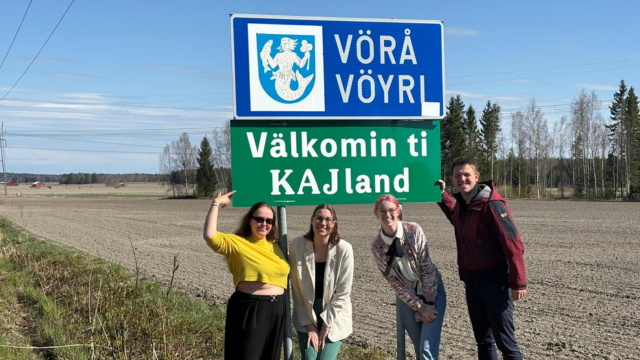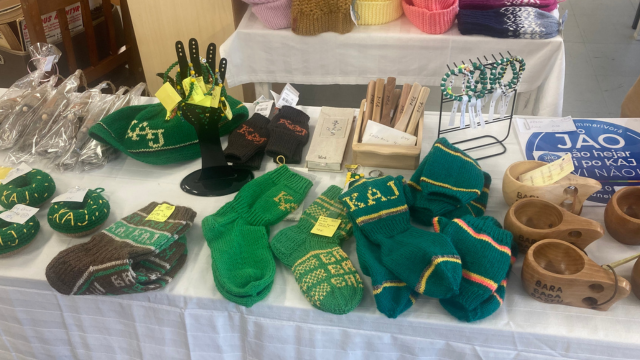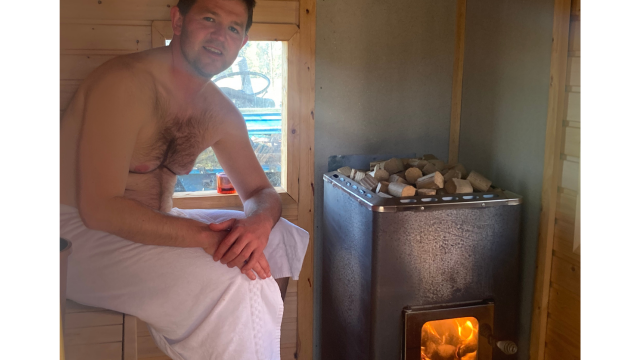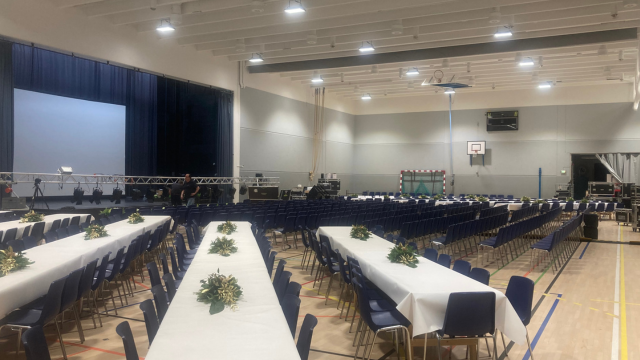It was sixteen years and one day ago that the Eurovision Song Contest had its fairytale moment, when Alexander Rybak stormed to a landslide victory and brought the trophy home to Norway, just in time for their epic National Day celebrations.
One of the reasons that Fairytale became such a runaway winner was because it worked on so many different levels. It fused folk-inspired orchestration with contemporary staging, delivered by a charming frontman whose virtuoso violin skills and boyish charisma made him someone Europe could unite behind. It was a performance that felt both ancient and modern, rural and urban, eastern and western, all at the same time.
Tonight, I find myself watching a very different kind of fairytale unfold in the Eurovision world. And I’m on the ground to witness it.
I’m here in the district of Vörå in rural north western Finland. It’s only around 35 to 40 minutes by car from the relatively bustling and cosmopolitan city of Vaasa, the region’s urban centre. But once you leave the city limits, the landscape changes basically immediately, flattening into a pancake of wheat fields before your eyes, with only the odd untouched section of forest breaking up the landscape. In this terrain, and in the isolated communities that live within them, time feels slower and community means everything.
This is the world that shaped KAJ.
This sparsely populated district, just 6,000 people spread across 1,500 square kilometres, is where the trio grew up. And it’s the world they sing about in their music. In a dialect specific to this slice of Swedish-speaking Finland, their songs tell the stories of life in these small villages: fixing your parents’ tech problems, grumbling through the routines of working life, the cultural calamity to food that is a taco night.

To this day, nobody in Vörå knowns who placed the “Välkomin ti KAJland” sign up on the entry into the district. (Photo: ESCXtra)
Because the community is so small, nearly everyone has crossed paths with them at some point. Locals remember them performing as teenagers. I’ve heard countless stories this week from those who’ve had them sing at company Christmas parties, shared saunas with them, played football with them as kids, worked as their music teacher.
And everybody wants to share their anecdotes about them, pointing out each location they’ve performed at, which is basically every outdoor theatre and youth centre in the district. I’m writing this from the restaurant where on arrival we were proudly told that their first ever gig was held, and for their efforts they were paid with a single slice of pizza.
Everybody is connected to the band in some way.
The district government even organised a coach tour through the region, half full of journalists, half full of curious pensioners from Vaasa who’d not been down to this region before, to visit the villages that KAJ sing about. The theme of the tour followed the lyrics of ‘Kom Ti Byin’, one of their best known songs, a tongue in cheek tribute to the villages of Vörå blending promotional pride, social commentary and KAJ brand humour.
Our first stop was Komossa, where Kevin grew up. It’s the kind of place so tucked away that when the coach turned off the main road, winding through a monotony of fields and past highland cattle, residents stopped what they were doing to watch us drive past with mouth-open-wide bemusement. A bus tour through Komossa? Had we gone the wrong way?
Komossa has a population of just 140 people. Its school building closed over a decade ago when the number of children dropped below the threshold needed to keep it open. But that building doesn’t stand empty today.
The local youth organisation was handed the keys by the municipality for the symbolic price of one euro, and today it’s been transformed into a community hub. When we arrived, the old school was alive again, decorated in KAJ’s colours, balloons dangling, sequins glinting. There was fresh coffee and tosca pie served, all in the finest china brought out for the special occasion, while we heard about the history of the building and the community from the head of the organisation, born and bred in Komossa, who moved a grand distance of eleven metres across the road from his childhood home to where he resides today.

The old schoolhouse in Komossa, now a community hub ran by the local youth organisation (Photo: Ben Robertson, ESC Insight)
For the Grand Final, a viewing party will be held here for everybody to cheer on Kevin. The community will gather to make pizzas before the show before gathering infront of the television to watch all together. It’s not going to just be a viewing party, but a celebration of the community coming together.
In ‘Kom Ti Byin’, KAJ sing about life in Komossa revolves around talkoo, a word for the kind of voluntary work that holds villages like this together. Whether it’s cleaning the community centre, making cakes, setting up chairs for events or folding away tables after a gathering, everybody pitches in. It’s not just tradition, without the community all chipping in, there is no community.
As a part of the week of celebrations, one of the local savings banks held a ceremony to distribute their funds to community organisations. I spoke briefly to one of them, the Rejpelt Hembygdsförening, which had received a few thousand euros as a grant to cover their maintenance costs and dance workshops for local children throughout the next year. Without financial support like this organisations like theirs would likely struggle, and with them the traditions and communities they represent might begin to fade away.
Because fading away is a real fear as time moves on. While some of the funding on Thursday went to preserving community life, another part awarded study grants to 25 young people over the age of 17 to pursue further education. Those opportunities don’t exist here in Vörå. They are found in Vaasa, or even further afield. And many who leave don’t return.
When ‘Kom Ti Byin‘ turns its focus to Palvis, Axel’s home hamlet, it speaks directly to this reality and the quiet vanishing of young people from the local area.
“There isn’t much to see, it is what it is
A field there, there and there
A lot of old people, they don’t hear what I say
Fertility is low, there will be hardly any more of us”
So on our tour, as we visited hamlet after hamlet, it was often the older generation who opened the doors. Those who stayed. Those who never left. Those who give their time and care to keep these little pockets of civilisation alive. So many of their children, children of the same age as KAJ, had moved on to pastures new.

KAJ themed handicrafts available at the Vörå Hemslöjd store in central Vörå (Photo: Ben Robertson, ESC Insight)
In that sense, KAJ are the embodiment of passing the torch. They show what it looks like for the younger generation to carry on the identity of this place. Each of the three members has also moved away to find work in bigger cities, but not once have they compromised their artistry or language to suit a wider audience. Their work is rooted in their upbringing on Finland’s rural west coast, and their pride in that is unwavering. They perform for the area, about the area.
It doesn’t just feel like everyone in Vörå has seen them perform. It feels like everyone in Vörå has grown up with them.
Everybody Gathers Together Tonight
Today is the day of the final party and the end of the festivities in the village. The focus is now in the centre of Vörå, and everyone is coming together to celebrate. While sauna is the unofficial theme, what we are witnessing is more like a homecoming parade, and everybody is gathering from the regional villages and hamlets to the centre of the district. There are chances for vintage cars, tractors, and motorbikes to show themselves off, and for a princely sum of 10 Euros you can drive your portable sauna in to the festival grounds and welcome friends old and new to sauna together.

Testing Robin’s 12-year-old sauna built out of an old playhouse. It lives on wheels for two reasons – to avoid planning permission from the municipality, and to drag it via tractor to the beach in winter for some ice swimming (Photo: ESC Insight, Alison Wren)
The KAJ journey began as the biggest underdogs of the National Final season. Invited to participate in Swedish Melodifestivalen without having any career this side of the Bothnian Sea, they started the betting markets as the rank outsider to win the competition. Not only did they go from zero to hero to win Melodifestivalen, but they have captivated Europe and are favourite contenders tonight.
The overwhelming response when I’m speaking to Vörå residents is that they are so incredibly proud of KAJ’s journey. That their hard work and comedic genius have entertained their community for a generation is now spreading itself further than anybody could have imagined. That it is possible not just to come from this part of the world, but to be your fully authentic self from Vörå and have Europe love you has got everybody puffing out their chests in pride. Ronnie Salonen, Chairman of football club Norrvalla FF stated how now thanks to KAJ he doesn’t have to lie and tell others even in Finland that he is from a place outside Vaasa, he can tell people he is from Vörå and that he talks the same way that KAJ do.
Now everybody knows.

The main sports hall at the Norrvalla complex will be the biggest screen in Vörå tonight, as over 1000 guests are expected to celebrate (Photo: Ben Robertson, ESC Insight)
We have never in the history of the Eurovision Song Contest had an entry that has been tipped to be one of the favourites that represents a regional culture as well as this. KAJ are a group that the community has enjoyed as they have grown up for their first gigs as teens to tens of people to now being booked for a summer long sauna tour across Sweden, Finland, and who knows where else after the Grand Final.
I don’t think there has ever been a song in the history of the Eurovision Song Contest that a community has got behind so much and is so proud of.
The Movie Script Turned Into Reality
Oh, except there is a story we all know.
There is a story of childhood friends growing up in a quiet northern village. One was full of dreams, certain that stardom was their fate. The other was more hesitant, but always by their side. Together they performed whenever they could. The local community may have teased them, but there was one hit everyone demanded to hear at every show.
Through unexpected circumstances they ended up in the big national final, and despite being given zero chances to win, eventually found themselves on the biggest music stage in the world. As that night arrived, people back home stopped their everyday routines that kept the village going and gathered together, eyes fixed on the screen, bums on the edge of their seats. Their village may have been small, but the sense of pride was enormous, and everybody wanted nothing more than for the performance to go well on Grand Final night.
Eventually, on the night, they brought the house down, bringing a tear to the eyes of everybody back home by making them proud of where they come from, telling the community story in a way few could have ever thought possible.
That, my friends, is The Story of Fire Saga. The Hollywood zero to hero Eurovision story.
KAJ’s journey is the same as that of Lars and Sigrit. Vörå is the exact same type of community as the isolated Icelandic community depicted in the movie. And ‘Bara Bada Bastu’ is their ‘Hứsavik’.
(No, Jakob, I know the temptation is there to sing Nessum Dorma and hit a Speorg note, but you aren’t allowed to do that).
What is happening here tonight is the closest the real Eurovision Song Contest has got to Netflix’s movie sensation. Tonight the district government has done everything they can to gather as many as possible together to watch the show. Around 20 percent of the population will be here in Norrvalla tonight where every single room in the building will be open with big screen TVs dotted everywhere, as the community gathers to watch the action unfold and cheer the boys they’ve all known for at least fifteen years to do them proud. Many of the other little hamlets dotted in this farming community will be doing the same as well. Everybody will gather together to witness the conclusion of this miracle adventure that only Hollywood could have tried to script.
I’m going to have a front row seat to watch it all unfold. There are tears in my eyes writing this because I know we have never such a community as proud of their Eurovision act (no, not Sweden’s, they are from Vörå tonight) through all its history, and we might never witness another one in my lifetime.









